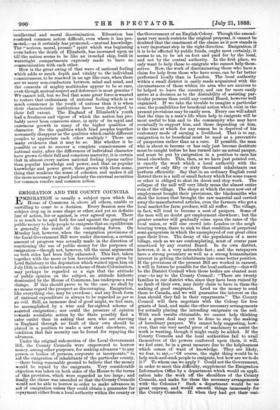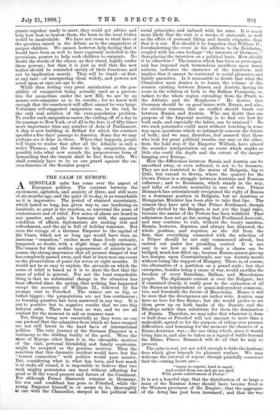EMIGRATION AND THE COUNTY COUNCILS.
EEMIGRATION is usually a subject upon which the House of Commons is, above all others, unable or unwilling to come to a decision. Every Session sees the subject crop up in some shape or other, and yet no definite line of action, for or against, is ever agreed upon. There is so much to be said both for and against the granting of public money to help people to emigrate that an equilibrium is generally the result of the contending forces. On Monday last, however, when the emigration provisions of the Local Government Bill were under discussion, a certain amount of progress was actually made in the direction of sanctioning the use of public money for the purposes of emigration—though not, however, till the usual arguments on both sides had been fully exhausted. This fact, taken together with the more or less favourable answer given by Lord Salisbury to the deputation which waited upon him on July 11th in order to advocate a scheme of State Colonisation, may perhaps be regarded as a sign that the attitude of public opinion on the subject, an attitude hitherto dominated by the House of Commons, has undergone a real chatige. If this should prove to be the case, we shall by no means regard the prospect as discouraging. Emigration, like everything else, may be overdone ; and any fresh form of • national expenditure is always to be regarded as per se an evil. Still, an immense deal of good might, we feel sure, be accomplished by a wise and far-sighted scheme of assisted emigration ; nor could the pressure of opinion towards socialistic action by the State possibly find a safer outlet than in asking that men who are starving in England through no fault of their own should be placed in a position to make a new start elsewhere, on condition that fair security can be found for repaying the advances.
Under the original sub-section of the Local Government Bill, the County Councils were empowered to borrow money, among other purposes, for making advances " to any person or bodies of persons, corporate or incorporate," to aid the emigration of inhabitants of the particular county, —there being reasonable ground to believe that the money would be repaid by the emigrants. Very considerable objection was taken on both sides of the House to the terms of this provision, which were regarded as too large ; and filially the clause was amended so that the County Councils would not be able to borrow in order to make advances in aid of emigration unless they could obtain a guarantee for repayment either from a local authority within the county or the Government of an English Colony. Though the amend- ment very much restricts the original proposal, it cannot be doubted that the enactment of the clause as it now stands is a very important step in the right direction. Emigration, if it is to be effected by public funds, ought most certainly, it seems to us, to be set on foot and paid for by the local, and not by the central authority. In the first place, we only want to help those to emigrate who cannot help them- selves. Now, the work of discriminating those who have a claim for help from those who have none, can be far better performed locally than in London. The local authority within a small district is easily made acquainted with the circumstances of those within its area who are anxious to be helped to leave the country, and can far more easily arrive at a decision as to the desirability of assisting par- ticular persons than could any central Board, however well organised. If we take the trouble to imagine a particular case, the possibilities for beneficial action which exist in the present provisions may be easily seen. Every one will admit that the time in a man's life when help to emigrate will be most useful to him and to the community who may have eventually to support him, and those depending on him, is the time at which for any reason he is deprived of his customary mode of earning a livelihood. That is to say, emigration to be beneficial must be used as a preventive of pauperism rather than as a cure. If possible, the man who is about to become or has only just become destitute must be caught before he has turned into an actual pauper, and must be put by emigration in a position to earn his bread elsewhere. This, then, as we have just pointed out, is exactly the work which a local authority with the purview of only fifty or sixty thousand inhabitants can perform efficiently. Say that in an ordinary English rural district there is a mill or small factory which for some reason or other is obliged to shut its doors and stop work. The collapse of the mill will very likely mean the almost entire ruin of the village. The shops at which the men now out of employment bought their provisions, the blacksmiths who shod the horses that brought the raw material and carried away the manufactured articles, even the farmers who got a local market for farm produce, will all suffer. The village, in fact, will tend to become a nest of paupers. Some of the men will no doubt get employment elsewhere ; but the greater number will gradually come upon the rates of the local union, or will else crowd into London or the neigh bouring towns, there to sink to that condition of perpetual semi-pauperism in which the unemployed of our great cities pass their lives. The decay of the population of a mere village, such as we are contemplating, must of course pass unnoticed by any central Board. In its own district, however, it is a very noticeable fact ; and the ratepayers have a strong pecuniary as well as a strong humanitarian interest in getting the inhabitants into some better position. If the provisions of the present Bill are worked in earnest, it will in future be possible for the local authority—this will be the District Council when those bodies are created next year—to say to the County Council : " There are twenty families in our district who, since they have been ruined by no fault of their own, may fairly claim to have in them the making of good emigrants. Lend us the money to send them to Canada, and we will guarantee the interest on the loan should they fail in their repayments." The County Council will then negotiate with the Colony for free grants of land, and make the other necessary arrangements for actually placing the intending emigrants on the soil. With such results obtainable, we cannot help thinking that a great deal may yet be done to stop the making of hereditary paupers. We cannot help suggesting, how- ever, that one very useful piece of machinery to assist the work is wanting, though it might easily be added. If the County Councils and the local authorities fail to avail themselves of the powers conferred upon them, it will, we feel sure, be in a great measure due to the helplessness which comes of want of knowledge. • They are likely, we fear, to say,' Of course, the right thing would be to help such-and-such people to emigrate, but how are we to do it ?' To whom can we apply ? Could not the Government, in order to meet this difficulty, supplement the Emigration Information Office by a department which would on appli- cation take the work off the shoulders of the County Councils, and make for them the necessary arrangements with • the Colonies ? Such a department would be no great expense, and would smooth things immensely for the County Councils. If, when they had got their emi- grants together ready to start, they could get advice and help how best to bestow them, the boon to the local bbdies would be incalculable. We have not room to treat here of the question raised in the debate as to the emigration of pauper children. We cannot, however, help feeling that it would have been as well to have expressly included in the provisions, powers to help such children to emigrate. No doubt the words of the clause, as they stand, legally confer these powers ; but then it is just as well that the new bodies should be reminded openly of their functions, and not by implication merely. They will be timid—at first, at any rate—of interpreting them widely, and powers not acted upon at once are apt to die. While thus feeling very great satisfaction at the pos- sibility of emigration being actually used as a preven- tive for pauperism under the new Bill, we are by no means over-sanguine as to its results ; for we know well enough that the numbers it will affect cannot be very large. Voluntary self-suggested emigration can, in the end, be the only real solution of the over-population problem. To render such emigration easier, the cutting off of a day in the passage to New York, or of £1 in the fare, is of fifty times more importance than any number of Acts of Parliament. A ship is now building in Belfast for which the contract specifies a five days' passage to America. Some day we may perhaps see it done in three. When that happens, people will begin to realise that after all the Atlantic is only a wider Thames; the desire to help emigration, may possibly take hat now sounds the preposterous form of demanding that the transit shall be free from tolls. We shall certainly have to be on our guard against the en- croachments of the Socialist gospel.



































 Previous page
Previous page